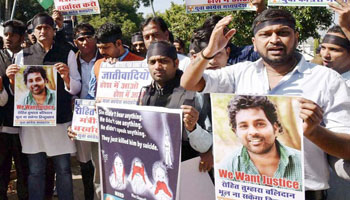“If we didn’t have caste-based reservations, caste wouldn’t be so relevant on campus and would become a non-issue. If we can shift to an economically backward reservation criteria rather than a caste based one today we have the technology for this we can curtail the stigma associated with caste. Unfortunately caste reservations, the very scheme assigned to make people equal become the biggest cause of discrimination on every campus.” This is the central message of the learned columnist Chetan Bhagat’s outcry ( TOI Jan 23, 2016) “Indian Institutes Of Politics” round the highly deplored unfortunate incident of Rohith Vemula suicide.
Very serious message of far reaching consequences can be seen in this statement if taken positively by those who can make difference in the destiny of India.. As a sincere cooperator I see a crystal clear lesson to be learnt by law makers on cooperative housing?
The ICA’s (International Cooperative Alliance) declared principles of cooperatives are accepted world-wide. It’s very first principle is: “Cooperatives are voluntary organizations, open to all persons capable of using their services and willing to accept the responsibilities of membership, without discrimination on bases of gender, social inequality, racial, political ideologies or religious consideration” This simply means the Cooperatives are expected to be completely indifferent to gender, social inequality, racial, political ideologies or religious consideration. All the member of a cooperative society are at par in terms of opportunity with just one vote on all the decisions of the society without any bias to gender, social inequality, racial, political ideologies or religious consideration.
Historically Indian social fabric is such that the society is still very very reluctant to insulate itself to gender, social inequality, racial, political ideologies or religious consideration. So how do we integrate our society in to international cooperative regime?
Cast based reservations of seats are tagged on with the gender based reservation of seats in management of every cooperative across India. This is attempted to be achieved through 2nd Proviso to Article 243ZJ(1) in “Part IXB: COOPERATIVE SOCIETIES “ inserted in the Constitution of India vide 97th Constitutional Amendment effective 13 2 2013. It reads:
Provided further that the Legislature of a State shall, by law, provide for the reservation of one seat for the Scheduled Castes or the Scheduled Tribes and two seats for women on board of every co-operative society consisting of individuals as members and having members from such class or category of persons:
In cooperative societies having objects driven by profit-motives minority representation in the management through such reservation compulsions could influence the fortunes of weaker sections. The motives of members are commercial and not merely social like those of members of the cooperative housing societies. In housing society the residents are aligned to some culture, eating habits, social beliefs etc. basically likeminded people as they are together 24X7 whole life. The housing society Bye-Law Model 2014 released post 97th Constitutional Amendment with a view to aligning to the MCS Act 1960 as amended vide Maharashtra cooperative societies (Amendment) Act 2014 also provides for such cast/gender based reservations as required vide two new Section 73B and 73C of the Act.
Having women members on the management committees of housing societies is a boon. If more than 2 women are willing they should be encouraged to contest in general category. Dearth of members with desire to serve its CHS is so rampant that a good social worker would get elected even without reservation.
Basis of reservation for Scheduled casts and Tribes (S C/ S T) when introduced to stay for a limited period, was members of these casts were economically weaker citizens by constitutional presumption. Unless they are insulated to competition from forward casts (who are presumed to be economically strong) they could never join the mainstream. If one think of economics of housing societies fundamental requirement for its membership is that a person “has purchased and owns a Flat / Unit in the Society” [Bye-Law No 3(xxiv)(a)(i) of latest Model Bye-Laws]. In what way a member of a CHS belonging to S C/ ST is economically weaker in comparison to any other member? In order to be in the good management of a CHS he must have a good service orientation and some competency. Members of housing societies are supposed to be equal without any discrimination within them-selves.
Why contesting election should distinguish a S C/ S T from the rest, especially objective of the membership of managing committee is not for an economic advancement of the incumbent. As a matter of fact this scheme operates against the cooperative principles as it leads to a division of a CHS in cast based constituencies and groups. It cannot be the constitutional imperative that rules of the cooperative societies divide people living to gather as one cooperative community in to caste based groups within the society’s membership as also with in the management team.. This has happened in the nation as a whole As of mow no statistics of caste based membership are maintained by housing societies as the members are all equal living identical rights and responsibilities. What interest needed to be protected of the members who belong to S C/ST in comparison to other members? Women reservations are encouraged as there needs to be a gender balance but impact cast balancing is surely running two housing societies within one.
And height of blunder is the Constitution mandate is for 1 seat reservation the Model Bye-Laws and Section 73B provides for 3 seats!
